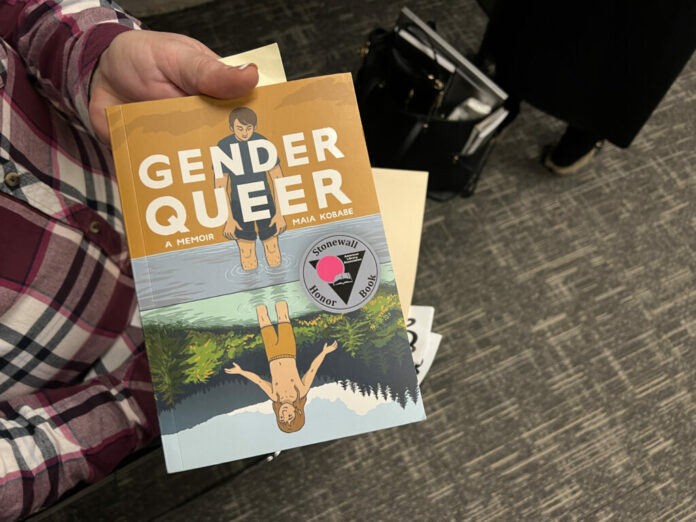By Casey Smith
Indiana Capital Chronicle
INDIANAPOLIS — Tensions rose at the Indiana Statehouse last week after a bill targeting materials deemed “harmful to minors” in school libraries was rolled back — and then amended again — in committee.
Language in the original version of the bill, authored by Sen. Jim Tomes, R-Wadesville, sought to remove “educational purposes” as a reason that public schools and libraries could claim legal protection for sharing “harmful material” with underage students. That includes books and other materials deemed to be obscene, pornographic or violent.
An amendment filed by Senate Judiciary Committee chairwoman Sen. Liz Brown, R-Fort Wayne, was adopted before testimony began on the bill, striking language that would make librarians criminally liable for distributing “harmful” materials to minors.
Numerous parents who testified pushed back, demanding that lawmakers reinstate language from Tomes’ original bill.
They argued that students should not have access to “raw” and “disgusting” works, pointing to school library books that deal with sex education, drug use, violence, sexual abuse and gender identity. They maintained, too, that school boards do nothing when parents complain about specific titles.
Testimony was later paused for the committee to adopt, along party lines, an impromptou amendment to bring back the provision removing the “educational” defense for school libraries and teachers. Colleges and public libraries could still use the defense against a charge of disseminating harmful material to minors, however.
The latest draft of the bill passed 7-4 from the committee and now heads to the full Senate.
Advocates for schools and libraries contend the issue goes beyond claims about pornography in libraries or legal defenses available in state statute.
More broadly, they said the issue stems from “fundamental differences” in values and opinions over what material is “appropriate” for Hoosier youth.
“I’m worried that librarians are going to stop collecting materials because they’re afraid of prosecution. They’re afraid of being taken into a criminal process,” said Chad Heck, representing the Indiana Library Federation. “We need to preserve this defense so that our librarians feel safe to represent the diverse values of our communities and patrons and students in our schools.”
The latest version of the bill
Under the bill in its current form, a local prosecutor could decide to charge a K-12 school teacher or librarian for giving harmful material to minors, meaning the educator could not argue in court that the material has educational value.
But they could still argue that the material has literary, artistic, political or scientific value as a whole.
As amended, the bill would also require school libraries to publicly post lists of books in their collection and create a formal grievance process for parents to object to certain materials in circulation.
Current Indiana law already outlines criteria that has to be met for a book to be considered illegal.
But Heck and others said the bill could embolden some prosecutors across the state to go after teachers and librarians if parents believe the books available to their children are harmful.
“If prosecutions do come from this law, should it be passed, they’re not going to survive a court — a jury is not going to find a teacher or a librarian guilty of having obscene materials or content harmful to minors in our collections, because we don’t have those types of materials in our collections,” Heck said.
He added that grievances are more appropriately handled by local school boards: “Sometimes people aren’t happy with the outcomes, and the result of that should be an election.”
Sen. Sue Glick, R-LaGrange, joined Democrats in voting against the bill. She said Tomes was “not happy” with the amended bill and is the reason the committee should “slow down” and ”revisit this issue.”
Tomes did not comment Wednesday on the latest draft of the bill, but said his intent was not to censor or ban books.
“If you have these books … put them where these kids can’t get them,” Tomes said. “I’m just trying to see that our kids can at least get through school and still have a level of innocence about them.”
A similar bill from Tomes failed in the 2022 session after K-12 librarians and educators argued they would be unfairly criminalized.
* * *
The Indiana Capital Chronicle is an independent, nonprofit news organization dedicated to giving Hoosiers a comprehensive look inside state government, policy and elections. The site combines daily coverage with in-depth scrutiny, political awareness and insightful commentary.
You can read the original version of the story here.





